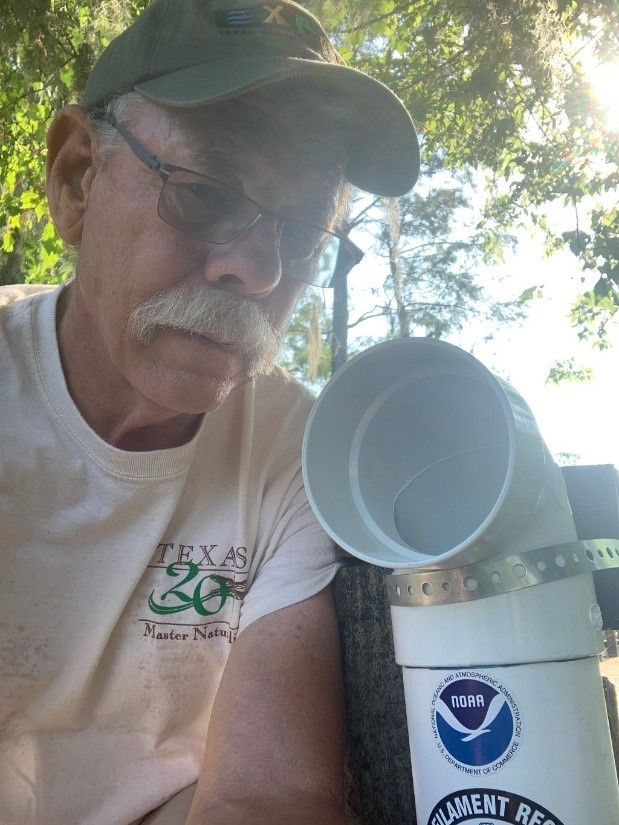TEXAS MONOFILAMENT RECOVERY & RECYCLING PROGRAM
By: Mickey Redus
Lower Trinity Basin Master Naturalist
On a warm, sunny morning, a minivan pulls up at the Trinity River Island Recreation Area. The doors open and four small children burst out. As Mom and Dad climb out and start unloading ice chest, lawn chairs and fishing equipment the kiddos race to the fishing pier.
There’s something fascinating about water and waterways. The kids had no interest in the playground nearby or the adjacent, grassy fields that provided spacious areas to run and play. They were immediately drawn to the river.
As the parents set up fishing poles the kids fell in line to try their hand at catching one of the mysterious, unseen creatures living in the dark, flowing waters of the Trinity River.
I was at the shore end of the pier, emptying a fishing line recycling bin as part of the Texas Monofilament Recovery and Recycling Program. As the family passed up and down the pier, they eyed me with curiosity and growing interest. I paused in my work, knelt by the kids and explained what I was doing, but more importantly, why I was doing it. Showing the recycle bin, I encouraged them to place any used or unwanted fishing line into the bin. I noticed that the parents were just as keenly interested.
At many of the 10 recycling bins I have visited over the last few weeks, similar conversations have taken place. Every person I spoke with expressed thanks and support. As users of our Texas waters, they realize that this is a program which directly benefits not only the outdoors of our great state, but also them personally.
So, what is the Texas Mono-filament Recovery and Recycling Program (MRRP)?
The Texas MRRP is a statewide campaign to heighten awareness about the negative impacts of mono filament line debris, to decrease the amount of fishing line entering and staying in the environment, and to increase the amount of line being recycled.
As volunteers (I like to think Ambassadors) in this program, we can participate directly in achieving the three stated goals of the program:
- Heighten Awareness – As we become aware of the problem and its effects on the environment, we must share that information with others. This might be kneeling down beside some children on a fishing pier and telling in very simple terms how important this activity is and how they can be a part of it. It might be a conversation with a fisherman on a remote point out in the bay. It could be a quick chat in line at a sporting goods store.
- Decrease the Amount of Fishing Line in the Environment – Through awareness of the problem, people come to understand the need to dispose of their discarded line properly. By making recycling bins available, we can make it convenient to do the right thing. We can identify locations where bins are needed and see that some are installed and maintained. The bins are simple to make and relatively inexpensive. I made several bins (4” diameter PVC) at a cost of under $20 each.
- Increase the Amount of Line Being Recycled – Volunteers ensure that bins are emptied on a regular basis. Overfilled or damaged bins are less likely to be utilized. Once the line is collected, it is either taken to select AgriLife Offices or mailed to a specific recycling facility which turns that unwanted line into tackle boxes and fishing lures.
For more information on this program, visit: mrrp.tamu.edu or “drop a line” to an existing volunteer!
To find out where the recycling centers are please click on this link “Monofilament recovery locations”




